Lý thuyết và bài tập áp dụng về câu điều kiện trong tiếng anh
Câu điều kiện: Tìm hiểu chi tiết về lý thuyết, cấu trúc và cách sử dụng của 3 loại câu điều kiện (
Loại 1, loại 2 & loại 3) Bài tập thực hành về câu điều kiện trong tiếng anh
Định Nghĩa Câu Điều Kiện
Câu điều kiện dùng để nêu lên một giả thiết về một sự việc, mà sự việc đó chỉ có thể xảy ra khi
điều kiện được nói đến xảy ra. Câu điều kiện gồm có hai phần (hai mệnh đề):
Mệnh đề nêu lên điều kiện (còn gọi là mệnh đề IF) là mệnh đề phụ hay mệnh đề điều kiện
Mệnh đề nêu lên kết quả là mệnh đề chính. Ví dụ: If it rains - I will stay at home. Mệnh đề điều
kiện - mệnh đề chính (Nếu trời mưa - tôi sẽ ở nhà.)
Hai mệnh đề trong câu điều kiện có thể đổi chổ cho nhau được: nếu mệnh đề chính đứng trước
thì giữa hai mệnh đề không cần dấu phẩy, ngược lại thì phải có dấu phẩy ở giữa. Ví dụ: You will
pass the exam if you work hard. (Bạn sẽ vượt qua kỳ thi nếu bạn học tập chăm chỉ.) => If you
work hard, you will pass the exam. (Nếu bạn học tập chăm chỉ, bạn sẽ vượt qua kỳ thi.)
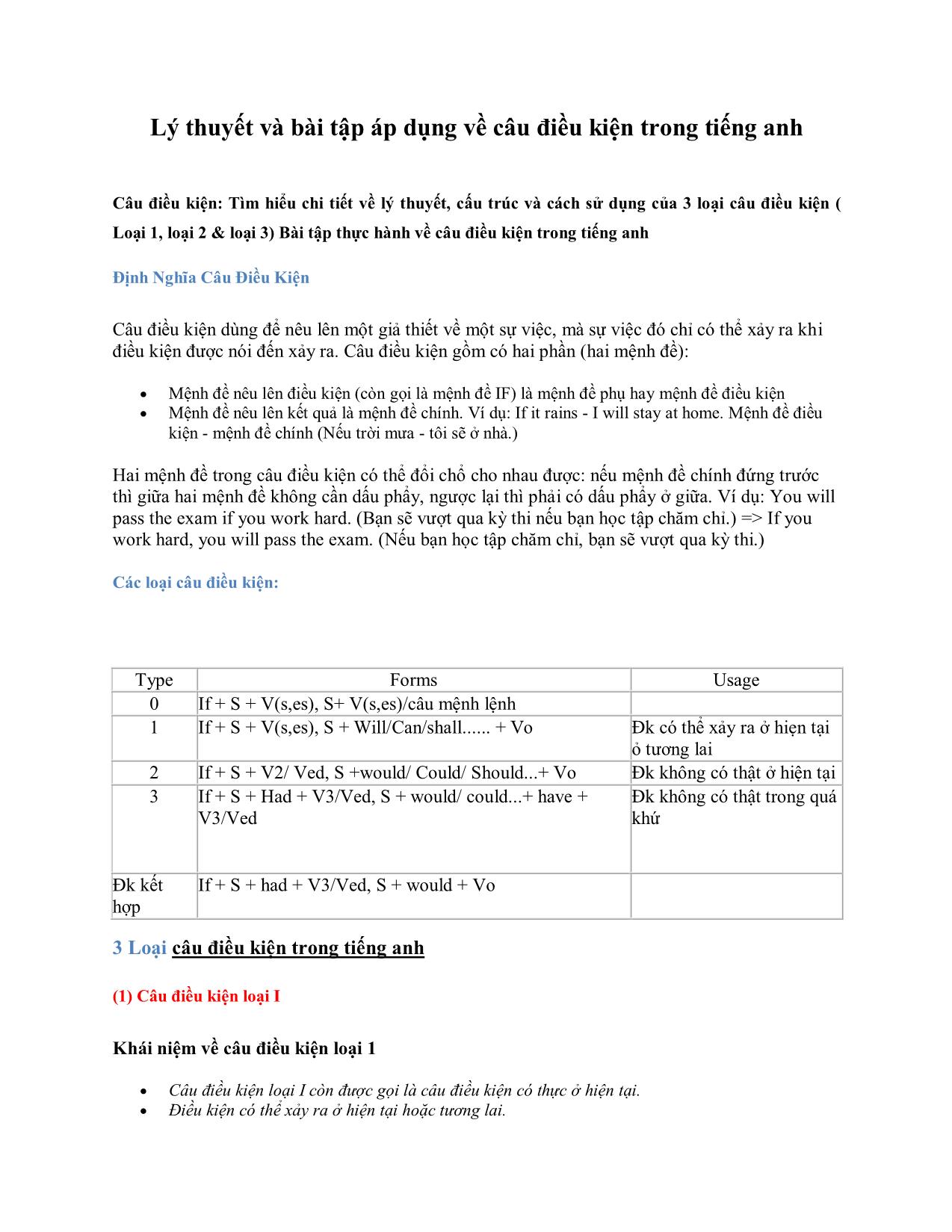
Trang 1
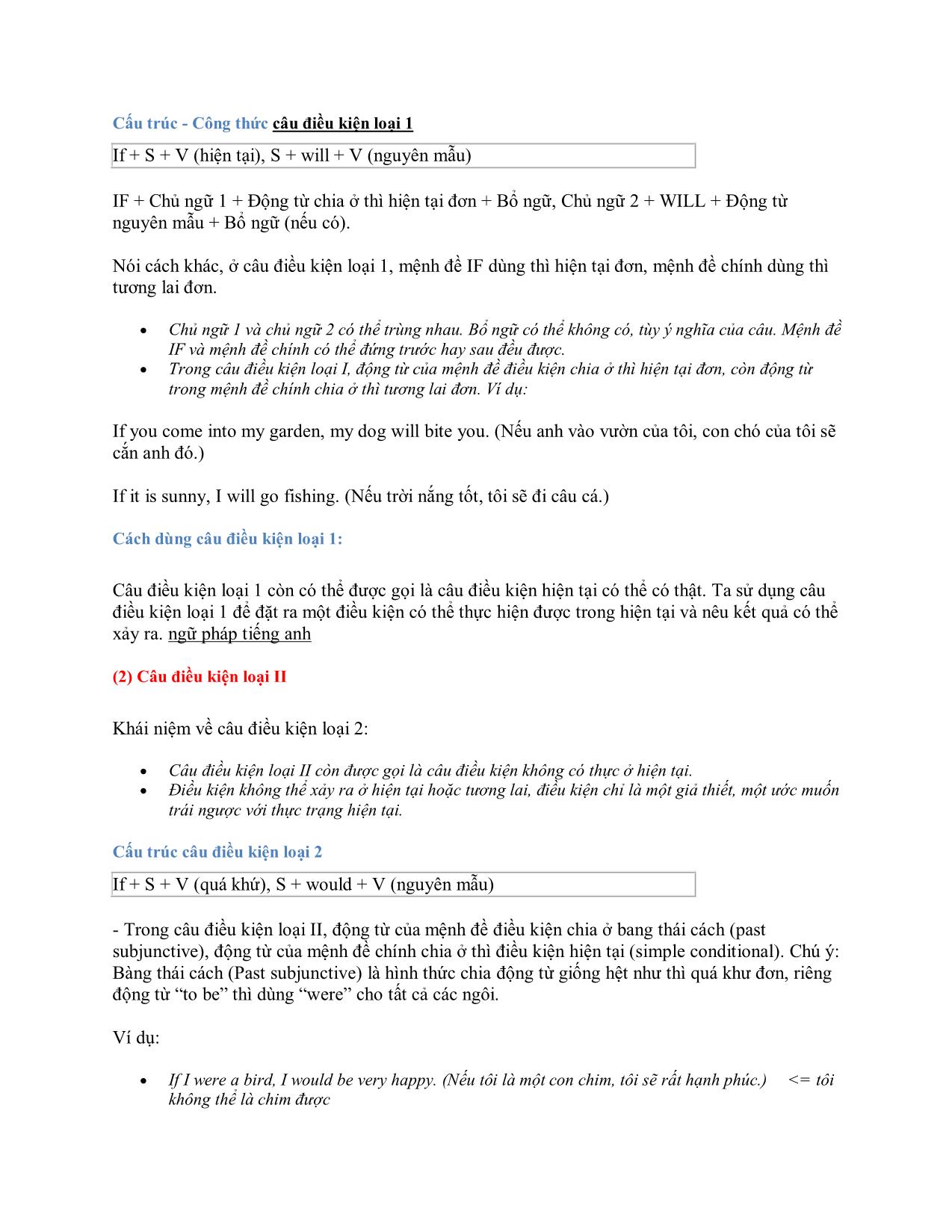
Trang 2
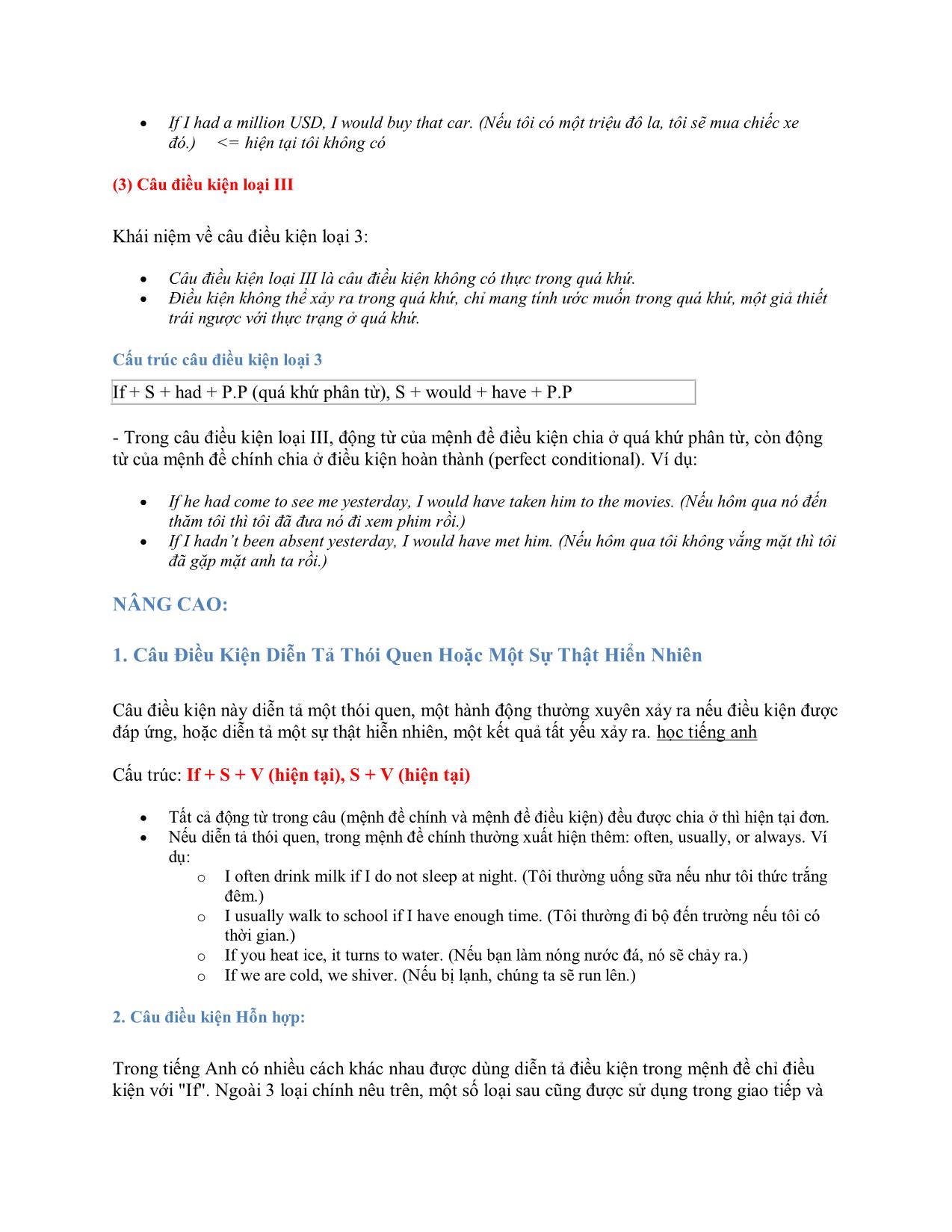
Trang 3
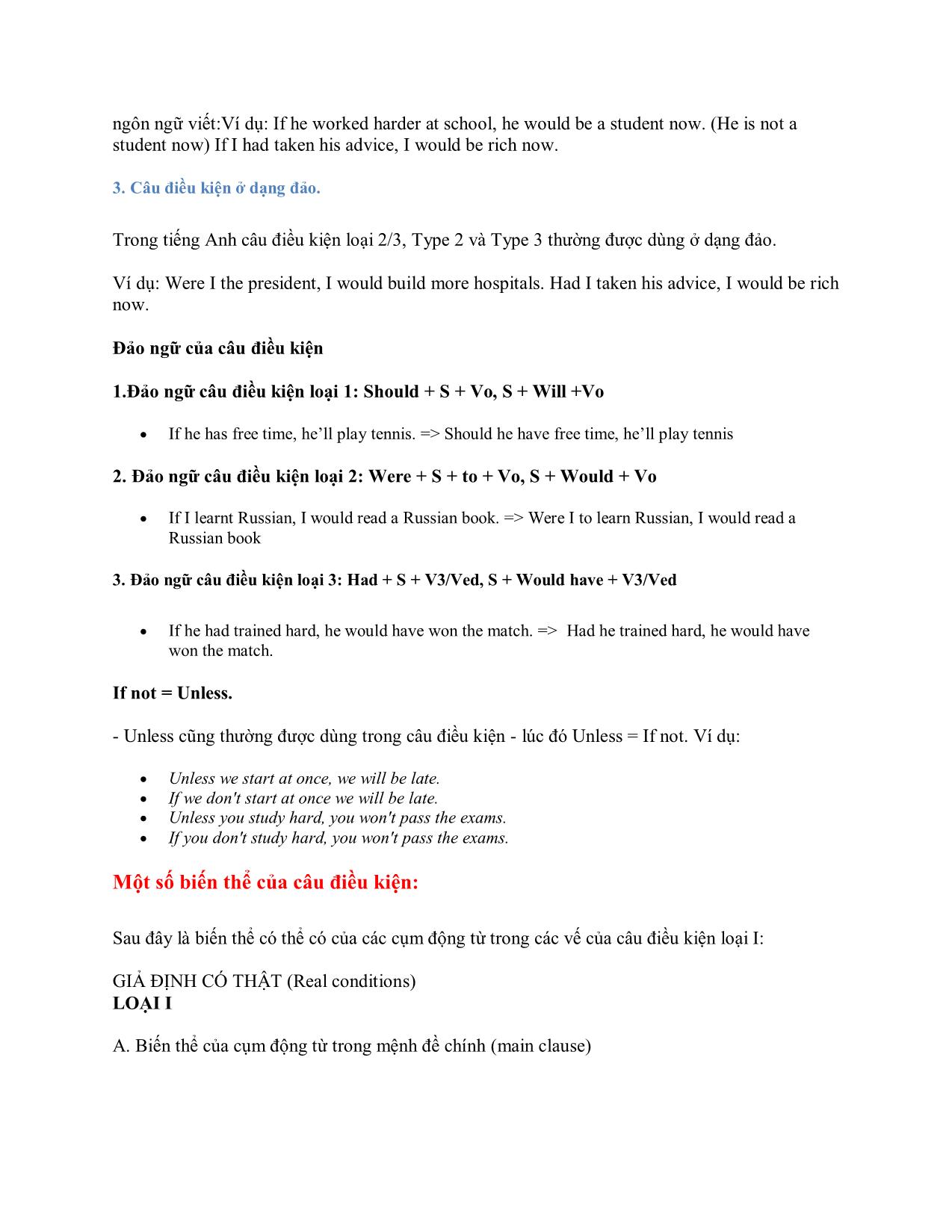
Trang 4
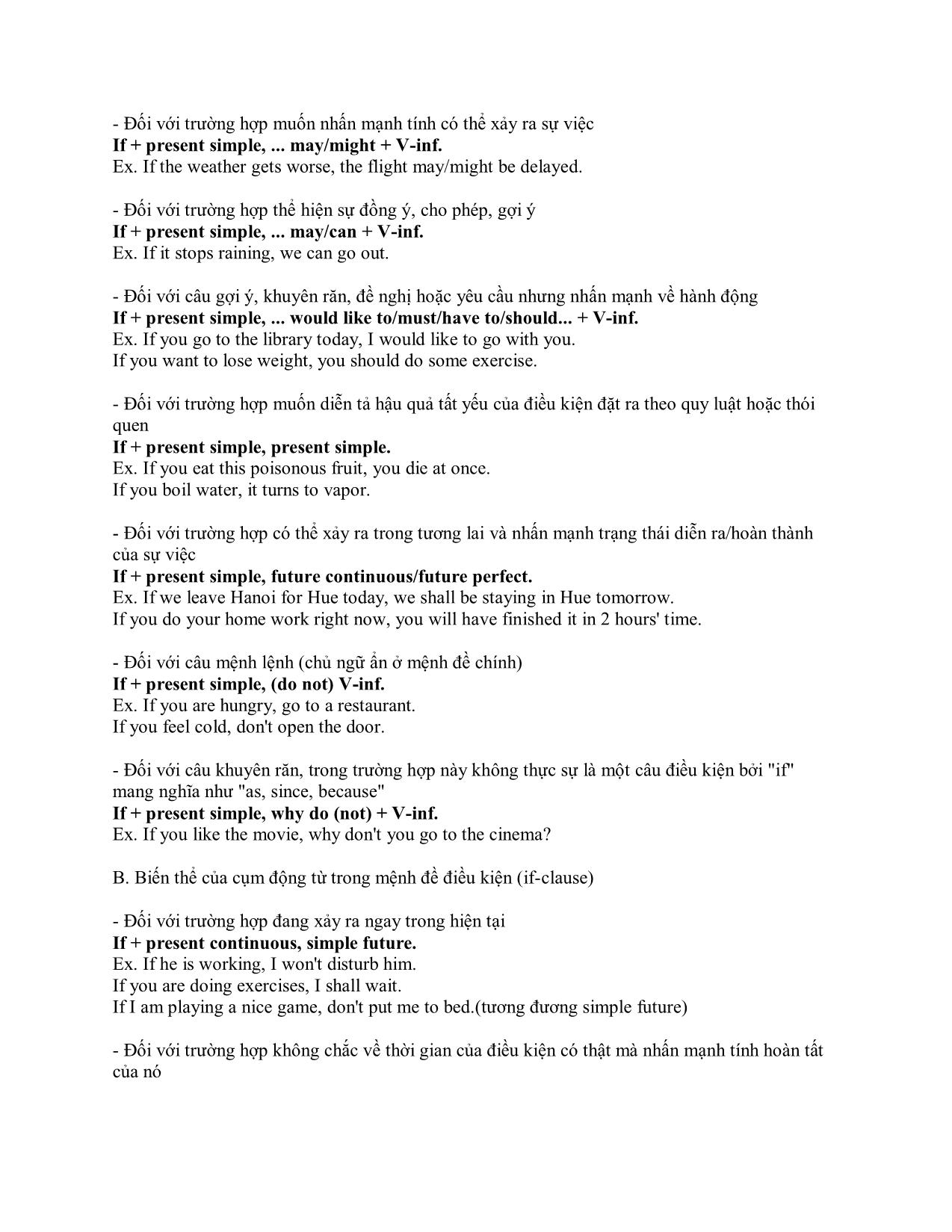
Trang 5
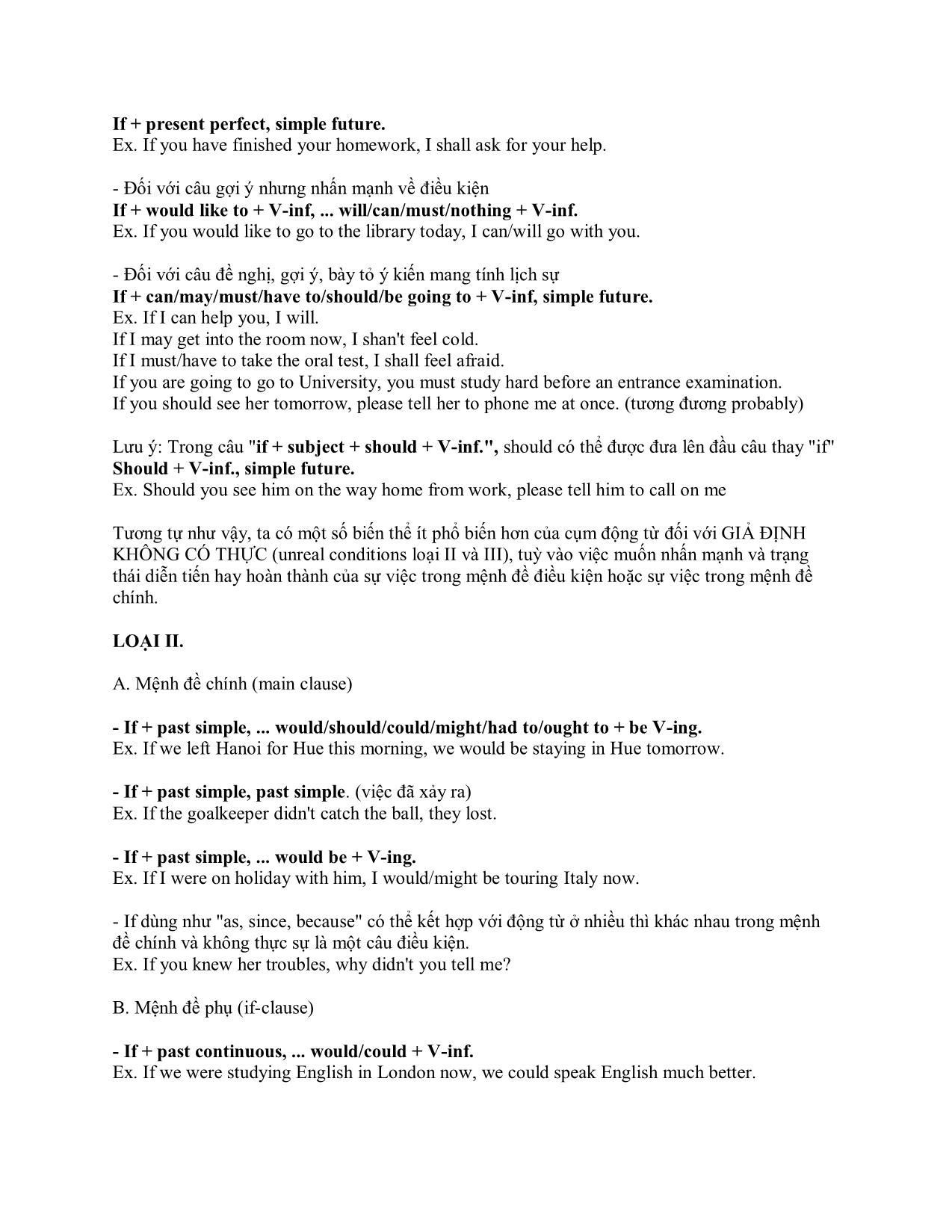
Trang 6
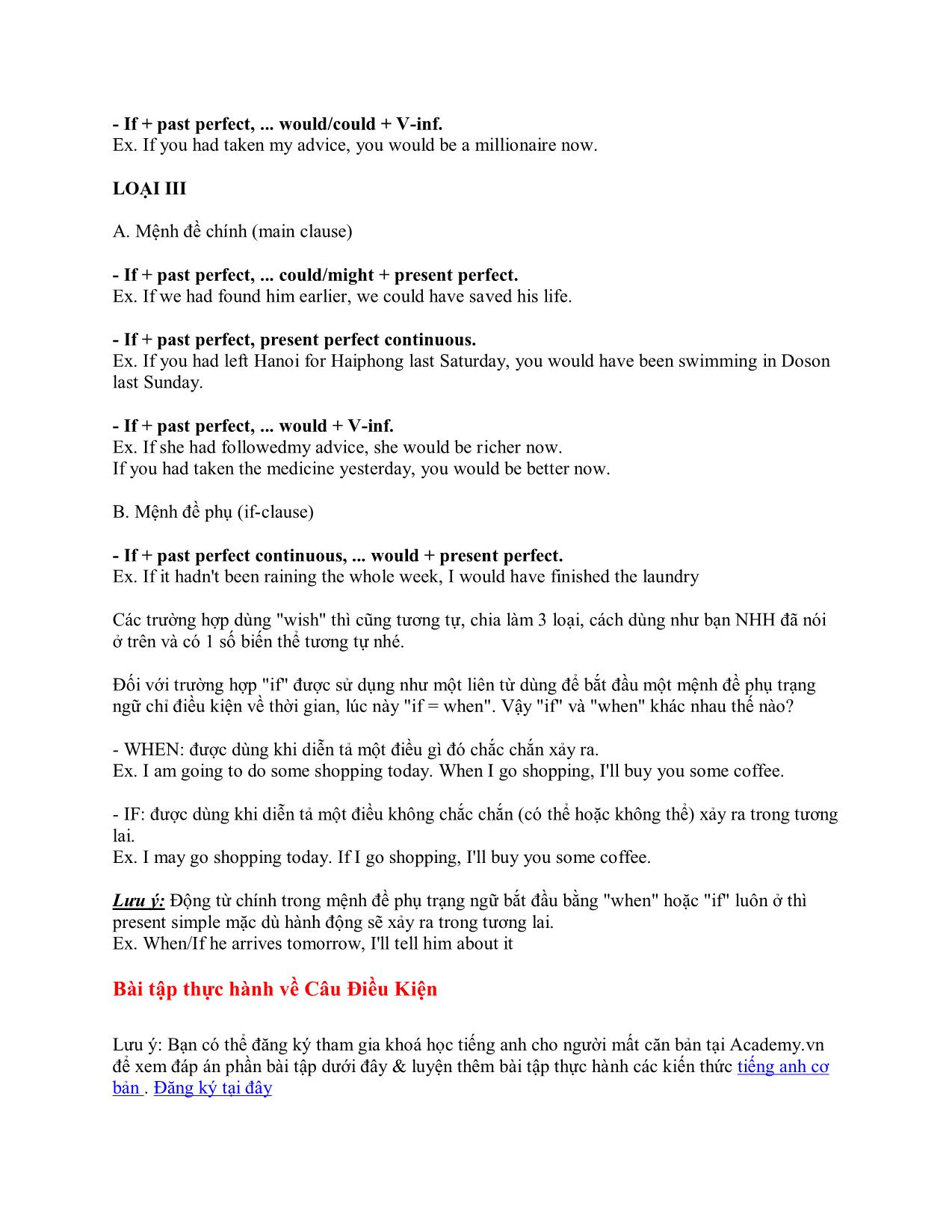
Trang 7
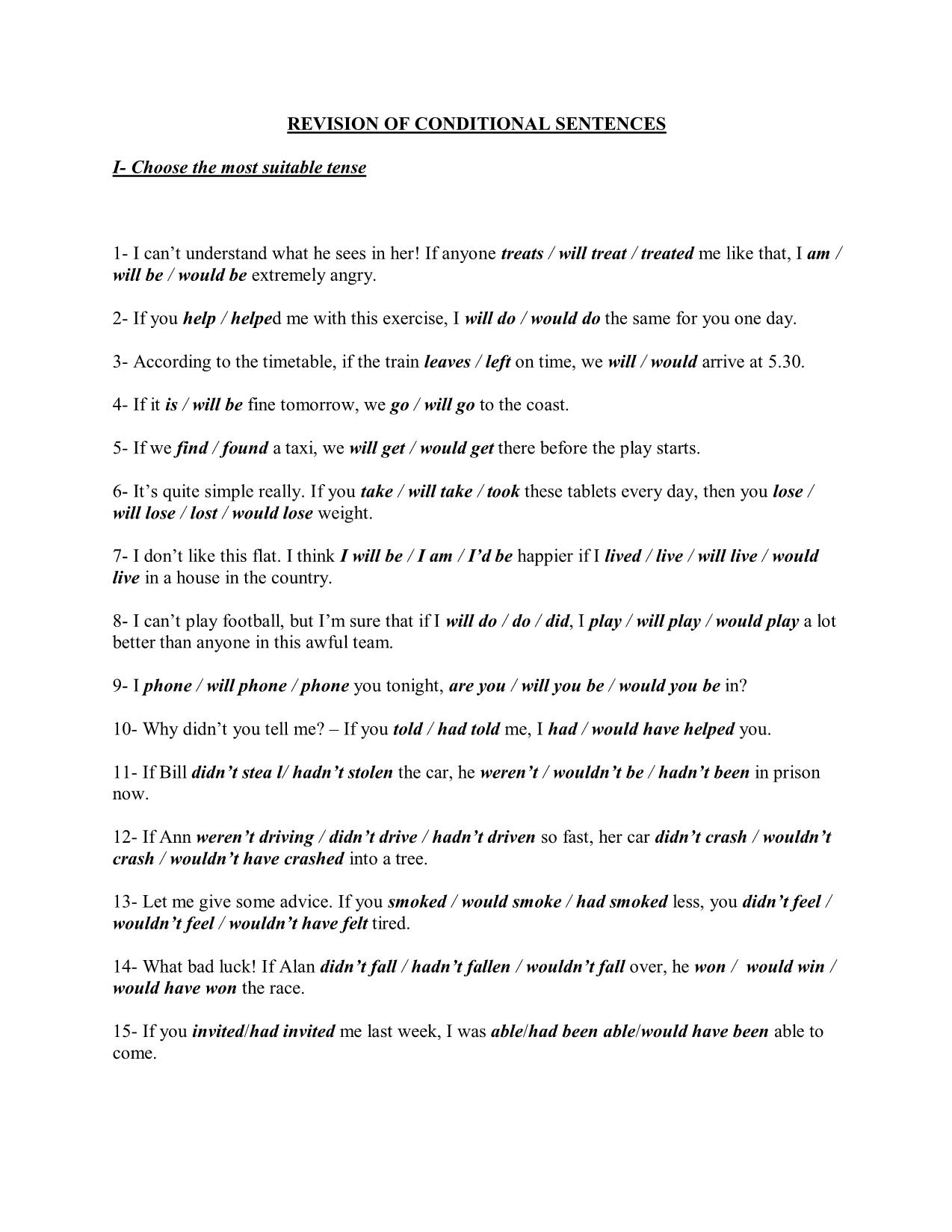
Trang 8
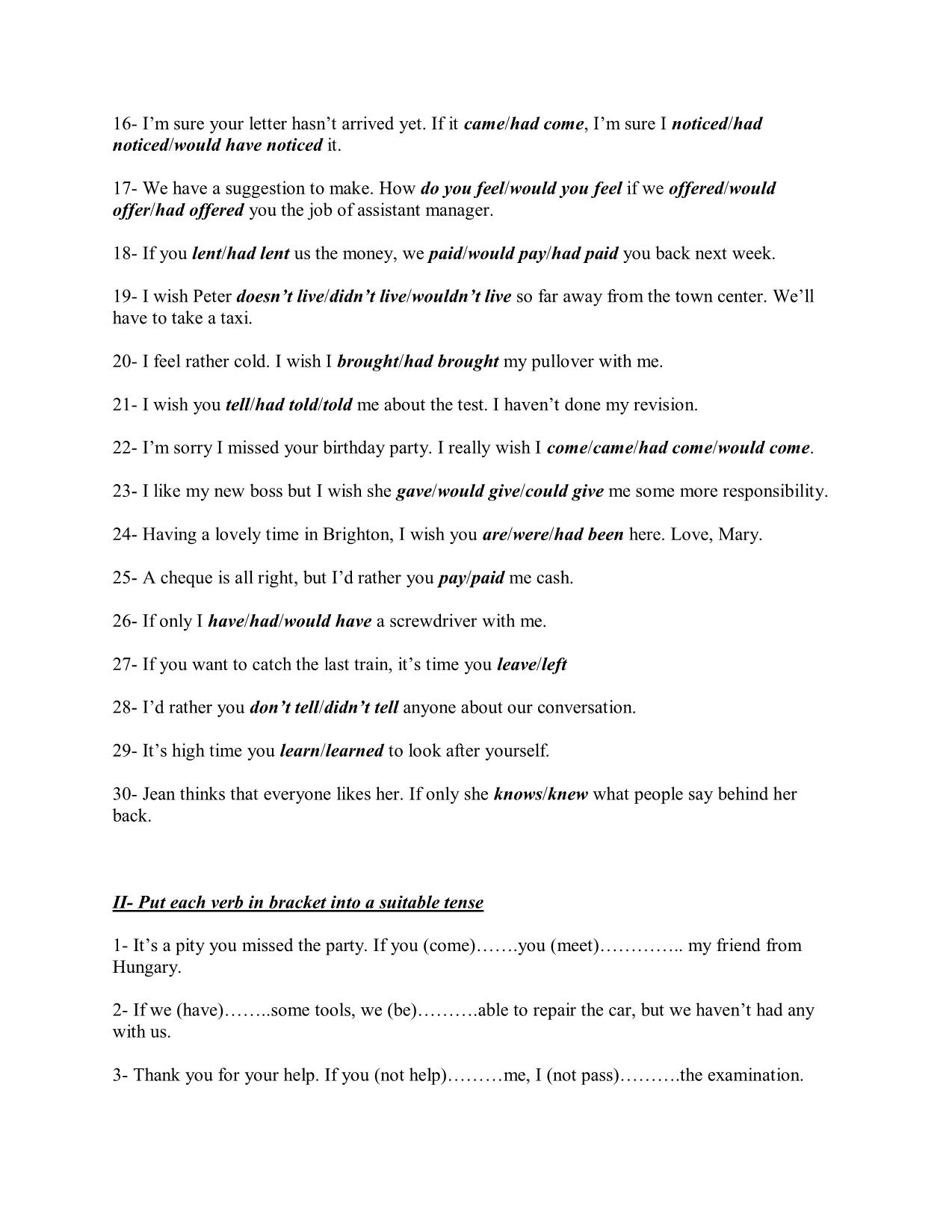
Trang 9
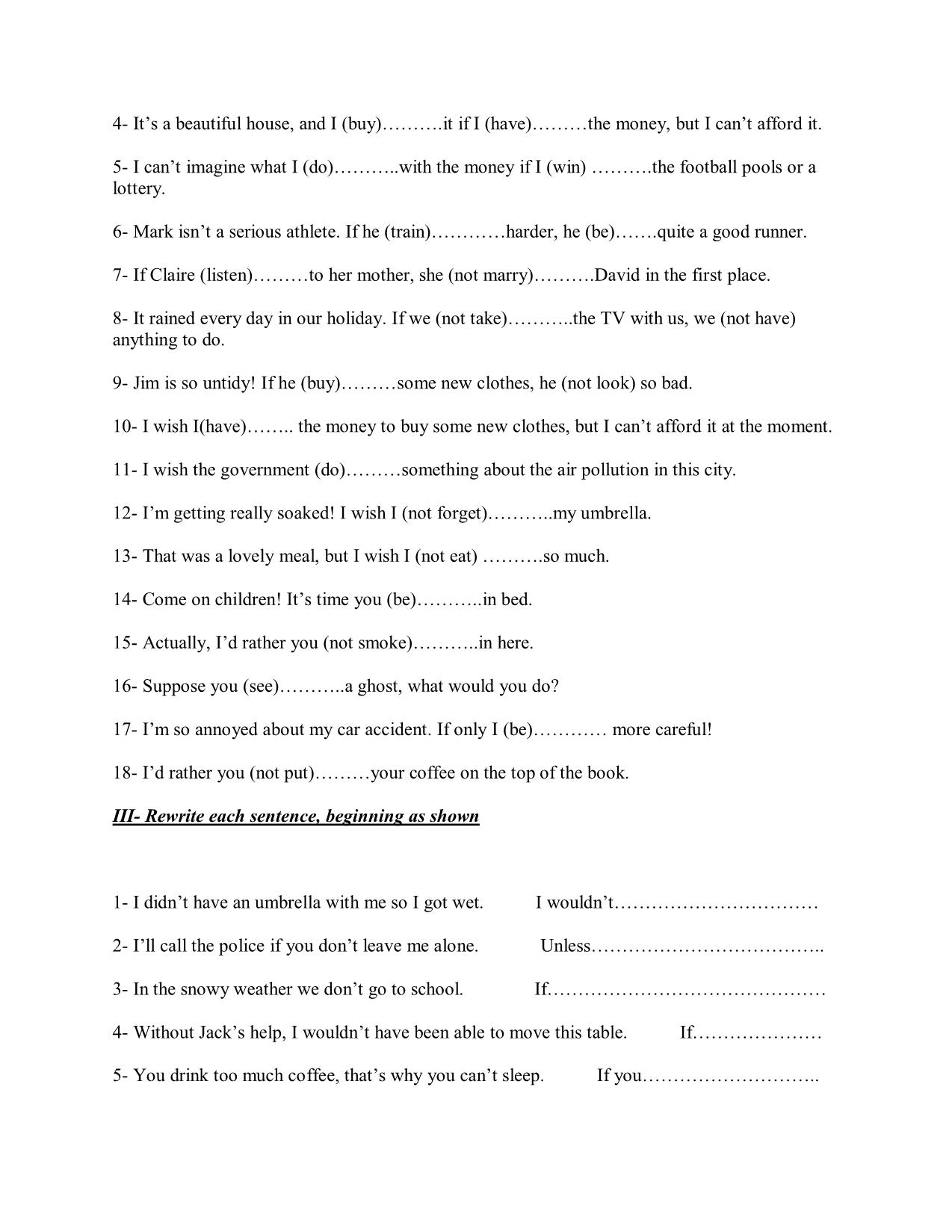
Trang 10
Tải về để xem bản đầy đủ
Tóm tắt nội dung tài liệu: Lý thuyết và bài tập áp dụng về câu điều kiện trong tiếng anh

you do your home work right now, you will have finished it in 2 hours' time. - Đối với câu mệnh lệnh (chủ ngữ ẩn ở mệnh đề chính) If + present simple, (do not) V-inf. Ex. If you are hungry, go to a restaurant. If you feel cold, don't open the door. - Đối với câu khuyên răn, trong trường hợp này không thực sự là một câu điều kiện bởi "if" mang nghĩa như "as, since, because" If + present simple, why do (not) + V-inf. Ex. If you like the movie, why don't you go to the cinema? B. Biến thể của cụm động từ trong mệnh đề điều kiện (if-clause) - Đối với trường hợp đang xảy ra ngay trong hiện tại If + present continuous, simple future. Ex. If he is working, I won't disturb him. If you are doing exercises, I shall wait. If I am playing a nice game, don't put me to bed.(tương đương simple future) - Đối với trường hợp không chắc về thời gian của điều kiện có thật mà nhấn mạnh tính hoàn tất của nó If + present perfect, simple future. Ex. If you have finished your homework, I shall ask for your help. - Đối với câu gợi ý nhưng nhấn mạnh về điều kiện If + would like to + V-inf, ... will/can/must/nothing + V-inf. Ex. If you would like to go to the library today, I can/will go with you. - Đối với câu đề nghị, gợi ý, bày tỏ ý kiến mang tính lịch sự If + can/may/must/have to/should/be going to + V-inf, simple future. Ex. If I can help you, I will. If I may get into the room now, I shan't feel cold. If I must/have to take the oral test, I shall feel afraid. If you are going to go to University, you must study hard before an entrance examination. If you should see her tomorrow, please tell her to phone me at once. (tương đương probably) Lưu ý: Trong câu "if + subject + should + V-inf.", should có thể được đưa lên đầu câu thay "if" Should + V-inf., simple future. Ex. Should you see him on the way home from work, please tell him to call on me Tương tự như vậy, ta có một số biến thể ít phổ biến hơn của cụm động từ đối với GIẢ ĐỊNH KHÔNG CÓ THỰC (unreal conditions loại II và III), tuỳ vào việc muốn nhấn mạnh và trạng thái diễn tiến hay hoàn thành của sự việc trong mệnh đề điều kiện hoặc sự việc trong mệnh đề chính. LOẠI II. A. Mệnh đề chính (main clause) - If + past simple, ... would/should/could/might/had to/ought to + be V-ing. Ex. If we left Hanoi for Hue this morning, we would be staying in Hue tomorrow. - If + past simple, past simple. (việc đã xảy ra) Ex. If the goalkeeper didn't catch the ball, they lost. - If + past simple, ... would be + V-ing. Ex. If I were on holiday with him, I would/might be touring Italy now. - If dùng như "as, since, because" có thể kết hợp với động từ ở nhiều thì khác nhau trong mệnh đề chính và không thực sự là một câu điều kiện. Ex. If you knew her troubles, why didn't you tell me? B. Mệnh đề phụ (if-clause) - If + past continuous, ... would/could + V-inf. Ex. If we were studying English in London now, we could speak English much better. - If + past perfect, ... would/could + V-inf. Ex. If you had taken my advice, you would be a millionaire now. LOẠI III A. Mệnh đề chính (main clause) - If + past perfect, ... could/might + present perfect. Ex. If we had found him earlier, we could have saved his life. - If + past perfect, present perfect continuous. Ex. If you had left Hanoi for Haiphong last Saturday, you would have been swimming in Doson last Sunday. - If + past perfect, ... would + V-inf. Ex. If she had followedmy advice, she would be richer now. If you had taken the medicine yesterday, you would be better now. B. Mệnh đề phụ (if-clause) - If + past perfect continuous, ... would + present perfect. Ex. If it hadn't been raining the whole week, I would have finished the laundry Các trường hợp dùng "wish" thì cũng tương tự, chia làm 3 loại, cách dùng như bạn NHH đã nói ở trên và có 1 số biến thể tương tự nhé. Đối với trường hợp "if" được sử dụng như một liên từ dùng để bắt đầu một mệnh đề phụ trạng ngữ chỉ điều kiện về thời gian, lúc này "if = when". Vậy "if" và "when" khác nhau thế nào? - WHEN: được dùng khi diễn tả một điều gì đó chắc chắn xảy ra. Ex. I am going to do some shopping today. When I go shopping, I'll buy you some coffee. - IF: được dùng khi diễn tả một điều không chắc chắn (có thể hoặc không thể) xảy ra trong tương lai. Ex. I may go shopping today. If I go shopping, I'll buy you some coffee. Lưu ý: Động từ chính trong mệnh đề phụ trạng ngữ bắt đầu bằng "when" hoặc "if" luôn ở thì present simple mặc dù hành động sẽ xảy ra trong tương lai. Ex. When/If he arrives tomorrow, I'll tell him about it Bài tập thực hành về Câu Điều Kiện Lưu ý: Bạn có thể đăng ký tham gia khoá học tiếng anh cho người mất căn bản tại Academy.vn để xem đáp án phần bài tập dưới đây & luyện thêm bài tập thực hành các kiến thức tiếng anh cơ bản . Đăng ký tại đây REVISION OF CONDITIONAL SENTENCES I- Choose the most suitable tense 1- I can’t understand what he sees in her! If anyone treats / will treat / treated me like that, I am / will be / would be extremely angry. 2- If you help / helped me with this exercise, I will do / would do the same for you one day. 3- According to the timetable, if the train leaves / left on time, we will / would arrive at 5.30. 4- If it is / will be fine tomorrow, we go / will go to the coast. 5- If we find / found a taxi, we will get / would get there before the play starts. 6- It’s quite simple really. If you take / will take / took these tablets every day, then you lose / will lose / lost / would lose weight. 7- I don’t like this flat. I think I will be / I am / I’d be happier if I lived / live / will live / would live in a house in the country. 8- I can’t play football, but I’m sure that if I will do / do / did, I play / will play / would play a lot better than anyone in this awful team. 9- I phone / will phone / phone you tonight, are you / will you be / would you be in? 10- Why didn’t you tell me? – If you told / had told me, I had / would have helped you. 11- If Bill didn’t stea l/ hadn’t stolen the car, he weren’t / wouldn’t be / hadn’t been in prison now. 12- If Ann weren’t driving / didn’t drive / hadn’t driven so fast, her car didn’t crash / wouldn’t crash / wouldn’t have crashed into a tree. 13- Let me give some advice. If you smoked / would smoke / had smoked less, you didn’t feel / wouldn’t feel / wouldn’t have felt tired. 14- What bad luck! If Alan didn’t fall / hadn’t fallen / wouldn’t fall over, he won / would win / would have won the race. 15- If you invited/had invited me last week, I was able/had been able/would have been able to come. 16- I’m sure your letter hasn’t arrived yet. If it came/had come, I’m sure I noticed/had noticed/would have noticed it. 17- We have a suggestion to make. How do you feel/would you feel if we offered/would offer/had offered you the job of assistant manager. 18- If you lent/had lent us the money, we paid/would pay/had paid you back next week. 19- I wish Peter doesn’t live/didn’t live/wouldn’t live so far away from the town center. We’ll have to take a taxi. 20- I feel rather cold. I wish I brought/had brought my pullover with me. 21- I wish you tell/had told/told me about the test. I haven’t done my revision. 22- I’m sorry I missed your birthday party. I really wish I come/came/had come/would come. 23- I like my new boss but I wish she gave/would give/could give me some more responsibility. 24- Having a lovely time in Brighton, I wish you are/were/had been here. Love, Mary. 25- A cheque is all right, but I’d rather you pay/paid me cash. 26- If only I have/had/would have a screwdriver with me. 27- If you want to catch the last train, it’s time you leave/left 28- I’d rather you don’t tell/didn’t tell anyone about our conversation. 29- It’s high time you learn/learned to look after yourself. 30- Jean thinks that everyone likes her. If only she knows/knew what people say behind her back. II- Put each verb in bracket into a suitable tense 1- It’s a pity you missed the party. If you (come).you (meet).. my friend from Hungary. 2- If we (have)..some tools, we (be).able to repair the car, but we haven’t had any with us. 3- Thank you for your help. If you (not help)me, I (not pass).the examination. 4- It’s a beautiful house, and I (buy).it if I (have)the money, but I can’t afford it. 5- I can’t imagine what I (do)..with the money if I (win) .the football pools or a lottery. 6- Mark isn’t a serious athlete. If he (train)harder, he (be).quite a good runner. 7- If Claire (listen)to her mother, she (not marry).David in the first place. 8- It rained every day in our holiday. If we (not take)..the TV with us, we (not have) anything to do. 9- Jim is so untidy! If he (buy)some new clothes, he (not look) so bad. 10- I wish I(have).. the money to buy some new clothes, but I can’t afford it at the moment. 11- I wish the government (do)something about the air pollution in this city. 12- I’m getting really soaked! I wish I (not forget)..my umbrella. 13- That was a lovely meal, but I wish I (not eat) .so much. 14- Come on children! It’s time you (be)..in bed. 15- Actually, I’d rather you (not smoke)..in here. 16- Suppose you (see)..a ghost, what would you do? 17- I’m so annoyed about my car accident. If only I (be) more careful! 18- I’d rather you (not put)your coffee on the top of the book. III- Rewrite each sentence, beginning as shown 1- I didn’t have an umbrella with me so I got wet. I wouldn’t 2- I’ll call the police if you don’t leave me alone. Unless.. 3- In the snowy weather we don’t go to school. If 4- Without Jack’s help, I wouldn’t have been able to move this table. If 5- You drink too much coffee, that’s why you can’t sleep. If you.. 6- Make me some coffee, and I’ll give you some sweets. If.. 7- If you hadn’t told me about Sue’s hair, I wouldn’t have noticed her. Unless. 8- If you see Peter, tell him he should be here at 8 00. Should 9- I wouldn’t accept if you ask me to marry you. If you were 10- What would you do if there were an earthquake? Supposing 11- If you do the shopping, I’ll cook lunch. You. 12-What would you do if you found some buried treasure? If you were.. 13- If Paul hadn’t been interested, the project would have been abandoned. But for. 14- If by any chance you find my wallet, could you let me know? If you happen.. 15- I might be late. If so, start without me. If I 16- The fire was brought under control thanks to the night watch-man. If it hadn’t... 17- Dick is in prison because a detective recognized him. If a... 18- If you want my advice, I’d think twice about buying a car like that. If I. 19- If the painting is finished by Saturday, we’ll pay you extra. Finish 20- Getting up early makes me feel hungry. If .. 21- Please don’t eat in the classroom. I’d rather 22- I think we should leave now. I think it’s time. 23- What a pity we ate all the food. If only we.. 24- It’s a shame we don’t have a TV. I wish IV- Rewrite each of the following sentences, using the word in the capital 1- If you do have any free time, could you give me a ring? SHOULD 2- We won’t go away if the weather is bad. UNLESS 3- I didn’t have the money, so I didn’t buy a new suit. WOULD 4- If you hurry up, you won’t be late. GOING 5- If they offered you the job, would you accept? WERE 6- If you are in London by any chance, come and see me. HAPPEN 7- Without you, I would have given up years ago. BEEN 8- Please take a seat, and I’ll inquire for you. WILL 9- Don’t take this job if you don’t really want it. UNLESS 10- I wasn’t tall enough to reach the shelf. TALLER 11- If the ship sank, what would you do? WERE 12- If you should notice what’s on at the cinema, let me know. HAPPEN 13- If you hadn’t encouraged me, I would have given up. BUT 14- I don’t have any money, so I can’t lend you any. IF 15- But for Helen, the play would be a flop. WERE V- Choose the best option 1- It would have been a much more serious accident..fast at the time. A- had she been driving B- was she driving C- she had driven D- she drove 2- Can I borrow your car for this evening? – Sure, but Nora’s using it right now. If she .. it back, you are welcome to borrow it. A- brought B- would bring C- will bring D- brings 3- I didn’t get home until well after midnight last night. Otherwise, I..your call. A- returned B- had returned C- would return D- would have returned 4- If energyinexpensive and unlimited, many things in the world would be different. A- is B- will be C- were D- would be 5- We..the game if we’d had a few more minutes. A_ might have won B- won C- had won D- will win 6- IAlan with me if I had known you and he didn’t get along with each other. A_ hadn’t brought B- didn’t bring C- wouldn’t have brought D- won’t bring 7- The lecturer last night didn’t know what he was talking about, but if Dr. Mason, I would have listened carefully. A- had been lecturing B- was lecturing C- would lecture D- lectured 8- If youto my advice in the first place, you wouldn’t be in this mess right now. A- listen B- will listen C- had listened D- listened 9- .. interested in that subject, I would try to learn more about it. A- Were I B- Should I C- I was D- If I am 10- If Ithe same problems you had as a child, I might not have succeeded in life as well as you have. A- have B- would have C- had had D- should have 11- Iyou sooner had someone told me you were in hospital. A- would have visited B- visited C- had visited D- visit 12- .more help, I could call my neighbor. A- Needed B- Should I need C- I have needed D- I should need 13- ..then what I know today, I would have saved myself a lot of time and trouble over the years. A- Had I known B- Did I know C- If I know D- If I would know 14- I didn’t know you were asleep. Otherwise, I..so much noise when I came in. A- didn’t make B- wouldn’t have made c- won’t make D- don’t make 15- When I stopped talking, Sam finished my sentence for me as though he my mind. A- would read D- had read C- reads D- can read 16- If you., I would have brought my friends over to your house this evening to watch A- had studied B- studied hoc tieng anh online C- hadn’t been studying D- didn’t study 17- I wish I..you some money for your rent, but I’m broke myself. A- can lend B- could lend C- would lend D- will lend 18- “Are you lost?” – “I think so. I wish we..the map with us today.” A- were bringing B- brought C- had brought D- would bring 19- If I weren’t working for an accounting firm, I..in a bank. A- work B- will work C- have worked D- would be working 20- What..today if you hadn’t come here this weekend?” – “I guess I’d be putting on extra hours at my office.” A- did you do - can you do C- will you be doing D- would you be doing
File đính kèm:
 ly_thuyet_va_bai_tap_ap_dung_ve_cau_dieu_kien_trong_tieng_an.pdf
ly_thuyet_va_bai_tap_ap_dung_ve_cau_dieu_kien_trong_tieng_an.pdf

